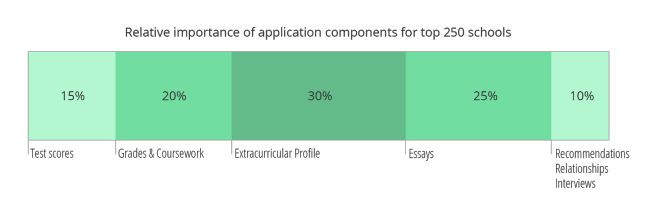AP Classes: How Much Do They Impact College Admissions?
AP classes are hard work, but scoring well on the exams can help you get into a good college, right? The answer is complicated. While colleges definitely seek out students whose transcripts are peppered with plenty of Advanced Placement courses, the AP exam scores are unlikely to have a significant impact on your odds of admission. However, that doesn’t mean you should skip the AP classes in favor of a less rigorous course of study. Keep reading to find out exactly how important AP classes are for college admissions. Various factors can impact a college’s decision to admit one student over another. In an effort to expedite the decision-making process, Ivy League colleges and other highly selective institutions often use something called the Academic Index. A tool for assessing applicants, the Academic Index is a calculation that reduces a student’s academic record to one numerical score for easy comparison. Along with GPA and class rank, a student’s AI includes SAT/ACT scores and SAT Subject Test scores. Because AP classes have a significant effect on GPA and rank, they can also impact your AI score. If a student doesn’t meet a college’s minimum AI threshold, they’re unlikely to be admitted, and may even be rejected automatically. Note, however, that under-represented minorities, legacy students, and recruited athletes may still be accepted even if their stats are lower than average for the institution. Of course, Academic Index isn’t the only important factor in admissions. However, when it comes to the relative importance of various application components, research shows that grades and coursework account for about 20%. Do colleges care about AP classes when evaluating applications? There’s no debate that course rigor is of high importance at the nation’s most competitive colleges. After all, top schools want to know that the students they admit can handle a challenging academic workload. With that in mind, students who plan to apply to top 20 colleges should strive to take as many AP classes as they can, without sacrificing their grades, hobbies, and mental health. Some high schools don’t offer many (or any) Advanced Placement classes. It’s important to know that you won’t be penalized for not taking classes that your school doesn’t have. While some students opt to self-study for APs, you can impress colleges simply by taking the most challenging courses available to you. So, how important are AP classes for college admissions? Very. However, AP exam scores are much less significant. Colleges prize applicants who sign up for AP classes and earn high grades, but you don’t have to panic over your scores on the actual exams. To that end, it’s up to you whether or not you choose to self-report your scores. If you earned several 4s or 5s, you should consider reporting. However, scores of 3 or lower are best left off an application. If you have one or two great AP scores and a few so-so ones, you should probably avoid submitting any scores, as only submitting a few scores might draw attention to the ones that are missing. Of course, AP classes are only one factor making up your academic profile. If you’re wondering whether or not you have the grades and scores to get into your top-choice school, start by comparing your stats to those of other admitted students. Many colleges reveal how the middle 50% of accepted students performed in high school. For example, if a college gives a middle 50% SAT range of 1200-1300, it means that 25% of accepted students scored below 1200, 25% scored above 1300, and the middle 50% scored between 1200 and 1300. When possible, you should try to fall towards the upper end of the middle 50%. Additionally, you can find this information through the Common Data Set, or CDS. Along with test scores, the CDS reveals other facts and figures that students can use to evaluate their odds of admission. The CDS also lets students view demographic breakdowns and enrollment stats. While some schools publish CDS data on their websites, others do not. This is where resources like our school search tool come in handy, as we list out the average stats of accepted students for over 500 colleges in the U.S. At College Vine, we’re passionate about helping all students improve their odds of gaining acceptance to their top-choice colleges. With that in mind, we encourage applicants to use our free Chancing Engine to determine their likelihood of acceptance. Unlike other calculators, it takes a holistic view of your application and accounts for more aspects of your individual profile, assessing qualitative factors like extracurriculars alongside academic stats. Best of luck!How Do Colleges Evaluate Applications?

How Much Do AP Classes Matter in College Admissions?

How Much Do AP Scores Matter in College Admissions?
Is Your Academic Profile Strong Enough for Your Colleges?


